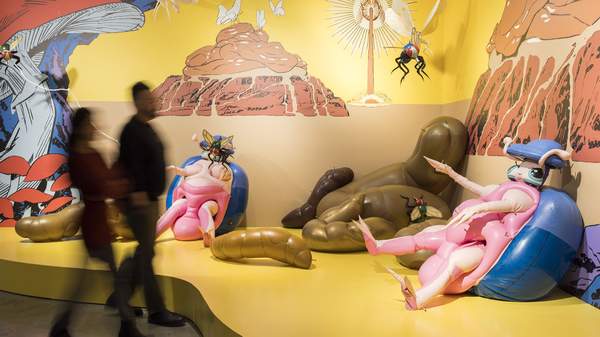Overview
Later this year, the Museum of Contemporary Art Australia will turn into an otherworldly space, all thanks to large-scale sculptures and architectural installations made out of brightly coloured fabric by South Korean artist Do Ho Suh. But that description also applies to its current exhibition Ultra Unreal, which is taking over the cultural institution from Friday, July 22–Sunday, October 2 — complete with hyper-real artworks that blend myth and reality into visions of the possible future.
The free showcase has taken up residence on The Rocks venue's first level, heroing work by six artists and collectives: Club Ate from Sydney; Korakrit Arunanondchai and Alex Gvojic, who work across Bangkok and New York; London-based Lawrence Lek; Shanghai's Lu Yang; and Saeborg from Tokyo. And while using the traditional tales that humanity has long told itself as a way to explore what might come is an approach obviously loaded with potential both visually and thematically, Ultra Unreal's roster of talent are all concerned with worldbuilding and nightlife ecosystems.
Lu Yang, installation view, Ultra Unreal, Museum of Contemporary Art Australia, Sydney, 2022, image courtesy and © the artist, photograph: Anna Kučera.
Accordingly, when you walk through the exhibition, you'll be peering at multi-sensory works that reflect upon the kinds of worlds we have, do and want to inhabit — and what goes into them, and the tales that spring up around them. That examination covers everything from religion, neuroscience and ecology through to artificial intelligence, gaming and queer club cultures, too, as created by artists who are drawing upon their own experiences and politics.
In pieces by Club Ate and Saeborg, for instance, the politics of the dance floor are pushed to the fore. Club Ate has crafted a video, sound and textile installation called Ang Idol Ko / You are My Idol, which finds inspiration in Filipinx mythologies and club cultures — while Saeborg's installation Slaughterhouse unsurprisingly gets dark, using a brightly coloured rural world filled with livestock that first began as a series of costumes and performances for Tokyo nightclub Department H, all to explore gender-based power and control.
Saeborg, Slaughterhouse, 2020–22, installation view, Ultra Unreal, Museum of Contemporary Art Australia, Sydney, 2022, latex, wallpaper, synthetic polymer paint, sound, image courtesy and © the artist, photograph: Anna Kučera.
Also featuring: Saeborg's Pootopia, which has been dubbed a "dung beetle paradise"; Yang's new series of works, which are set in digital worlds filled with genderless avatars and include his latest avatar DOKU; Arunanondchai and Gvojic's immersive installation No history in a room filled with people with funny names 5, which comes to Australia for the first time; and Lek's Nepenthe series, including an augmented reality project that lets visitors enter new worlds on each of the MCA's levels.
Ultra Unreal is kicking off with a weekend of artists events, too, including a night of club-inspired performances, music and screenings on Friday, July 22.
Club Ate (Justin Shoulder, Bhenji Ra, and collaborators), ANG IDOL KO / YOU ARE MY IDOL (detail), 2022, installation view, Ultra Unreal, Museum of Contemporary Art Australia, Sydney, 2022, 2-channel video, HD, colour, sound, fabric, image courtesy and © the artists, photograph: Anna Kučera
Ultra Unreal is on display at the Museum of Contemporary Art Australia, 140 George Street, The Rocks, Sydney, from Friday, July 22–Sunday, October 2.
Top images: Saeborg, Pootopia (detail), 2020–22, installation view, Ultra Unreal, Museum of Contemporary Art Australia, Sydney, 2022, latex, wallpaper, synthetic polymer paint, sound, image courtesy and © the artist, photograph: Anna Kučera.
Korakrit Arunanondchai and Alex Gvojic (with Tosh Basco), No history in a room filled with people with funny names 5 (detail), 2018, installation view, Ultra Unreal, Museum of Contemporary Art Australia, Sydney, 2022, 3-channel video, HD, colour, sound, resin casts of Basco's head and Arunanondchai's grandfather's hands, seashells, plants, soil, mirror, laser, LED, haze, image courtesy and © the artist, photograph: Anna Kučera.
Lawrence Lek, Geomancer, 2017, installation view, Ultra Unreal, Museum of Contemporary Art Australia, Sydney, 2022, single-channel video, HD, colour, sound, image courtesy and © the artist, photograph: Anna Kučera.
